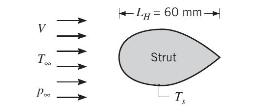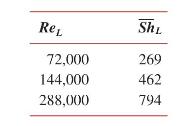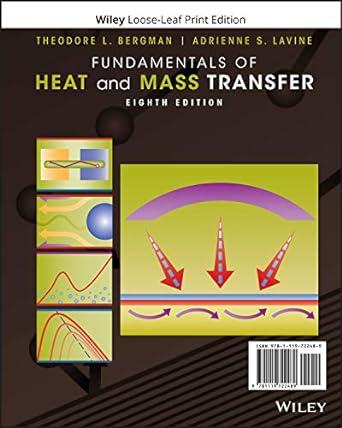A strut is exposed to a hot airflow. It is necessary to run experiments to determine the
Question:
A strut is exposed to a hot airflow. It is necessary to run experiments to determine the average convection heat transfer coefficient \(\bar{h}\) from the air to the strut in order to be able to cool the strut to the desired surface temperature \(T_{s}\). It is decided to run mass transfer experiments on an object of the same shape and to obtain the desired heat transfer results by using the heat and mass transfer analogy.
 The mass transfer experiments were conducted using a half-size model strut constructed from naphthalene exposed to an airstream at \(27^{\circ} \mathrm{C}\). Mass transfer measurements yielded these results:
The mass transfer experiments were conducted using a half-size model strut constructed from naphthalene exposed to an airstream at \(27^{\circ} \mathrm{C}\). Mass transfer measurements yielded these results:

(a) Using the mass transfer experimental results, determine the coefficients \(C\) and \(m\) for a correlation of the form \(\overline{S h}_{L}=C R e_{L}^{m} S c^{1 / 3}\).
(b) Determine the average convection heat transfer coefficient \(\bar{h}\) for the full-sized strut, \(L_{H}=60 \mathrm{~mm}\), when exposed to a free stream airflow with \(V=\) \(50 \mathrm{~m} / \mathrm{s}, T_{\infty}=184^{\circ} \mathrm{C}\), and \(p_{\infty}=1 \mathrm{~atm}\) when \(T_{s}=70^{\circ} \mathrm{C}\).
(c) The surface area of the strut can be expressed as \(A_{s}=2.3 L_{H} \cdot l\), where \(l\) is the length normal to the page. For the conditions of part (b), what is the change in the rate of heat transfer to the strut if the characteristic length \(L_{H}\) is doubled?
Step by Step Answer:

Fundamentals Of Heat And Mass Transfer
ISBN: 9781119220442
8th Edition
Authors: Theodore L. Bergman, Adrienne S. Lavine





